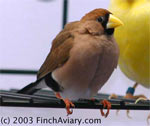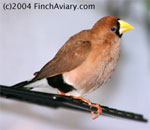|
PHOTOGRAPHY
TOPICS
|
||
|
|
|
|
|
How
to Photograph Birds in an Acrylic Aviary (cont) Avoid Stressing Your Birds Use a telephoto lens if you can. If the birds are not aware of you, you cannot be stressing them out. Plus, you can get photographs of the birds in their natural state, doing their everyday things. If you can't use a telephoto lens, adhere to the following guidelines. Don't choose their naptime for your photography session. Although during this time, they may be less flighty, it is not a good idea. For one thing - how would you like to be woken up from your sleep so that some big frightening thing can chase you around with some unknown device that makes noise and sometimes shoots light? Secondly, unless you are intentionally trying to capture a sleeping bird, you probably are not going to capture your birds at their best. Sleeping/tired birds tend to crouch low on the perch and fluff up a bit. This makes them look a little sickly. They also tend to have closed or partially closed eyes. The eyes need to be wide open and bright to bring the viewer into the picture and to show off the bird. Like I said before, the eyes should be the focal point of the photograph. If you really want a photograph of a sleeping bird, take a quick shot, or just a few, and end it there, quickly. Or use a telephoto lens so as not to disturb them. Do not chase your birds from one location to another. Choose the location you want to shoot at and stay there. Be patient. If they get used to your presence and they like the spot, they will probably return, at least briefly. If you give up on your chosen location, move as inconspicuously as possible to where the birds are to try to get some more pictures. But do not keep hounding them, chasing them back and forth. Once they've moved, allow them to calm down and relax a little before moving again and only do this a couple of times. If you can, turn your flash off. If flash upsets your birds, do not use it. Even if they don't seem overly disturbed by it, limit the amount of time you spend taking flash photographs. Only allow your photo sessions to last a few minutes. Limit your photo sessions to one during the course of the day. Try to space photo sessions out by several days. If you follow these guidelines, it shouldn't be an ordeal for them; but still, you want to put your birds first. You will hopefully have many years to get the pictures you want - be patient. One final note that goes without saying - if your birds are breeding, do not take any chances. Unless you are certain that the parents are good parents and will go on sitting/feeding even if disturbed, do not attempt to photograph them except from a distance with a telephoto lens and no flash. Click Previous to go back to Getting Close-ups. Click Next to advance to Camera Buying Advice. |
HOME | CONSTRUCTION
| CARE | BIRDS
| ACCESSORIES | BACKGROUND
AVICAM | GALLERY
| GUESTBOOK | LINKS
| SEARCH
SITE MAP | DISCLAIMER
| CONTACT US
(c)2004 FinchAviary.com

